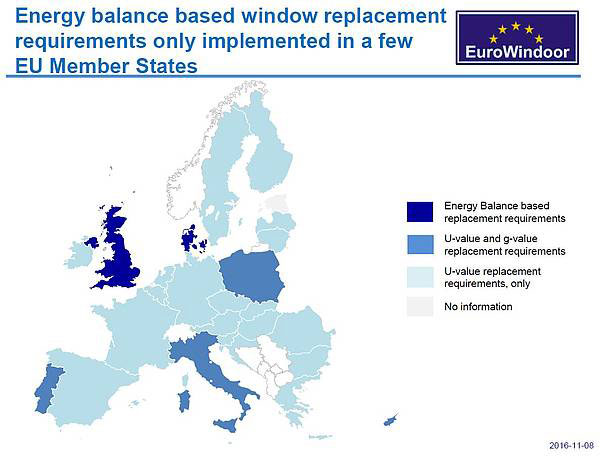Energy Efficiency
Home » Energy Efficiency
Energy Performance of Buildings
Study on “Heating energy savings in residential buildings due to window replacement” by Ingenieurbüro Prof. Dr. Hauser GmbH (IBH)
The study prepared by Ingeniurbüro Prof. Dr. Hauser GmbH (IBH) is showing that the significant impact of solar gains is missing in requirements for window replacement, where only heat losses are taken into account.
The inclusion of solar gains in national requirements can help to optimize the energy performance of buildings and ensure with that the maximum energy saving potentials. Key points are:
- Renovation of windows in the building stock covers a very high potential in terms of energy- and CO2-saving and the possible amount of energy savings is large compared to other measures.
- Solar gains (g-values) have to be taken into account beside transmission losses (U-values) for windows and other transparent building elements.
- In many cases legal requirements for windows are only formulated on the basis of U-values, and this may lead to suboptimal or even cost-intensive solutions.
- The energy performance of windows with a worse (higher) U-Value in combination with a better (higher) g-value is often more effective and as well less cost-intensive.
- All these statements can be confirmed on a building level as well as on a national or even EU-wide level
Study on “Heating energy savings in residential buildings due to window replacement” by Ingenieurbüro Prof. Dr. Hauser GmbH
Complementary Information: Executive Summary
EuroWindoor reply to EPBD Public Consultation questionnaire (October 2015)
EuroWindoor position on Benefits of windows and glazed areas (March 2016)
Other languages: DE
EuroWindoor EPBD Infographic Windows for healthier buildings (March 2016)
Other languages: DE | FR | PT | CZ
Revising the Energy Performance of Buildings Directive: Tapping the potential of windows
The Energy Performance of Buildings Directive (EPBD) has contributed to improving the energy performance of European buildings since its recast in 2010. EuroWindoor with the related associations European Aluminium, ES-SO and Glass for Europe are strong supporters of this framework. Those four associations cooperate together to tap the potential of windows with the revising of the EPBD and publish on November 9th, 2016 a Joint Position Paper to this important item. The revision of the EPBD is a unique opportunity to optimise the energy performance of buildings, as well as cost optimality. When revising the Directive, our sector considers that the following key points should be strengthened or included:
- Increasing the renovation rate of European buildings to obtain larger energy use reductions
- Using the energy balance approach to assess the energy performance of windows
- Recognising the benefits of daylight, natural ventilation and solar management
Joint Position – Revising the Energy Performance of Buildings Directive (November 2016)
Consultation from DG Energy on the evaluation of the Energy Performance of Buildings Directive
The European Commission launched on 30th June a public consultation on the evaluation of the Energy Performance of Buildings Directive. The objective of this consultation is to consult stakeholders on the review of the Energy Performance of Buildings Directive and evaluate whether the directive has met its aims. The consultation will also explore issues in relation to the Smart Finance for Smart Buildings initiative and the links of the directive with other energy policy areas.
The consultation is divided into 12 sections:
- Overall assessment
- Facilitating enforcement and compliance
- Energy performance certificates and stimulating energy efficient renovation of the building stock
- Financing energy efficiency in buildings and creation of markets
- Energy poverty and affordability of housing
- Ensuring new highly efficient buildings using a higher share of renewable energy
- Links between the EPBD and district and city levels, smart cities, and heating and cooling networks
- Awareness, information and building data
- Sustainability, competitiveness and skills in the construction sector
Building systems requirements - Operational management and maintenance
- Further comments
Crucial role of windows in the Energy Performance of Buildings Directive
EuroWindoor AISBL as a strong supporter of the EPBD holds the opinion, that the revision of the EPBD is an opportunity to better recognise the crucial role windows play in terms of daylight, indoor climate and energy efficiency. On March 15th, 2016 in Nuremberg EuroWindoor AISBL agreed on a position paper “The benefits of windows and glazed areas” and the connected Infographic “Windows for healthier buildings”.
When revising the EPBD, the following key points should therefore be further included:
- Stimulation of the renovation rate of European buildings by acknowledging the importance of non-energy aspects as driving renovation:
The rate of building renovation is too low: below 1.2% per year! Triggering renovations in Europe is key in obtaining large energy use reductions in our buildings, and the replacement of windows plays a crucialrole in achieving this goal. - Focus on daylight, indoor climate aspects and a dynamic building envelope to ensure that European citizens live and work in healthier buildings:
A study from Fraunhofer (IBP) 2015, states that around 80 million Europeans live in damp or unhealthy buildings, which has a great impact of the health and well-being! - Assessment of the energy performance of windows based on the energy balance approach to be defined in the specific heating and cooling climatic conditions:
Why only regulating one part of a window’s function while leaving the contributing part of solar gain out? In addition to their insulation properties, windows provide free solar heat gains to buildings.
Ecodesign and Energy Labelling for Windows
Key arguments against EU Energy Labeling are based on the following:
- Window products and the purchase situation of windows cannot be compared with white goods and electronic products.
- The energy savings potential depend on the specific climate, building etc. The EU Energy label can potentially misguide, and windows are more than energy performance.
- Will be against building regulations so far, which are based on national climatic conditions, and not determined at EU level.
- Double regulation (CE marking is already at place and include energy related characteristics for windows)
- No documentation of added value for customer (affordability and risk of misguidance)
- No documentation of the cost and administrative burden for industry
- No justification of an EU label compared to national labels or doing nothing.
- Better regulation is questioned.
Communication with DG Energy regarding EU Energy Label for windows
EuroWindoor met with DG Energy regarding EU Energy Label for windows on July 15th, 2015 (see Picture) where the position of EuroWindoor was explained in detail.
But DG Energy presented in the beginning of September working documents on a Delegated Regulation for Energy Labelling of Windows without taking the position of EuroWindoor into account.
In the consultation forum meeting on 30th September the proposal from the EU Commission was discussed with Member States and Stakeholders. EuroWindoor introduced more detailed arguments which were published in the EuroWindoor reply to the Working Documents on Delegated Regulation for Energy Labelling Windows before.
EuroWindoor prepared after the forum an EuroWindoor follow up on Consultation Forum 30/9 2015 and forwarded new figures from an analysis of Ecofys end of September to DG Energy.


